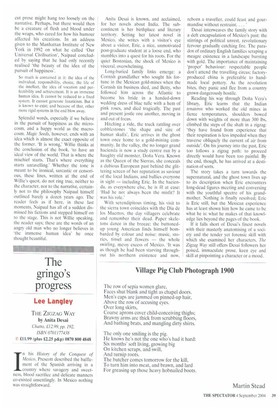The gringo's progress
Lee Langley
THE ZIGZAG WAY by Anita Desai
Chatto, £12.99, pp, 192, ISBN 0701177438
.r.; 111.99 (plus 12.25 p&p) 0870 800 4848 In his History of the Conquest of Mexico, Prescott described the bafflement of the Spanish arriving in a country where savagery and sweetness, blood sacrifice and delicate manners co-existed unsettlingly. In Mexico nothing was straightforward. Anita Desai is known, and acclaimed, for her novels about India. The subcontinent is her birthplace and literary territory. Setting her latest novel in Mexico, she writes with a visitor's eye about a visitor, Eric, a nice, unmotivated post-graduate student at a loose end, who stumbles into a quest for his roots. For the quiet Bostonian, the shock of Mexico is visceral, overwhelming.
Long-buried family links emerge: a Cornish grandfather who sought his fortune in the Mexican gold-mines when the Cornish tin business died, and Betty, who followed him across the Atlantic to become his bride in a handed-down wedding dress of blue tulle with a hem of pink roses, and died tragically. The past and present jostle one another, moving in and out of focus.
Hitching a ride, the truck rattling over cobblestones 'the shape and size of human skulls'. Eric arrives in the ghost town once home to a gold-mining community. In the valley, the no longer grand hacienda is now a study centre run by a haughty old monster, Dona Vera. Known as the Queen of the Sierras, she conceals a dubious European past behind the glittering screen of her reputation as saviour of the local Indians, and bullies everyone in sight — including Eric. In the hacienda, as everywhere else, he is ill at ease: 'Had he not always been the misfit? It was his role.'
With serendipitous timing, his visit to the sierra town coincides with the Dia de los Muertos, the day villagers celebrate and remember their dead. Paper skeletons dance in the breeze; the buttonedup young American finds himself bombarded by colour and noise: music, stories, tinsel and flowers — the whole swirling, messy excess of Mexico. 'It was as though he had been starving throughout his northern existence and now,
reborn a traveller, could feast and gourmandise without restraint...
Desai interweaves the family story with a deft encapsulation of Mexico's past: the stirrings of political unrest, revolutionary fervour gradually catching fire. The paradox of ordinary English families scraping a meagre existence in a landscape bursting with gold. The importance of maintaining 'proper' behaviour: respectable people don't attend the travelling circus; factoryproduced china is preferable to handmade local pottery. As the revolution bites, they panic and flee from a country grown dangerously hostile.
Reading his way through Dona Vera's library, Eric learns that the Indian tenateros who worked the old mines in fierce temperatures, shoulders bowed down with weights of more than 300 lbs, climbed the steps of the shaft in a zigzag: 'they have found from experience that their respiration is less impeded when they traverse obliquely the current of air from outside'. On his journey into the past, Eric too follows a zigzag path: to proceed directly would have been too painful. By the end, though, he has arrived at a destination of sorts.
The story takes a turn towards the supernatural, and the ghost town lives up to its description when Eric encounters long-dead figures meeting and conversing with the youthful spectre of his grandmother. Nothing is finally resolved; Eric is Eric still, but the Mexican experience has at least shown him how he came to be what he is: what he makes of that knowledge lies beyond the pages of the book.
If it falls short of Desai's finest novels with their masterly anatomising of a society and the tender yet forensic skill with which she examined her characters, The Zigzag Way still offers Desai followers her poised, immaculate prose, keen eye and skill at pinpointing a character or a mood.
Village Pig Club Photograph 1900 The row of sepia women glare, Faces shut blank and tight as chapel doors. Men's caps are jammed on pinned-up hair, Above the row of accusing eyes.
Over long skirts, Coarse aprons cover child-conceiving thighs; Brawny arms are thick from scrubbing floors, And bathing brats, and mangling dirty shirts.
The only one smiling is the pig. He knows he's not the one who's had it hard: Six months' soft living, growing big On kitchen scraps, and swill, And turnip roots.
The butcher comes tomorrow for the kill, To turn him into meat, and brawn, and lard For greasing up those heavy hobnailed boots.


































































 Previous page
Previous page